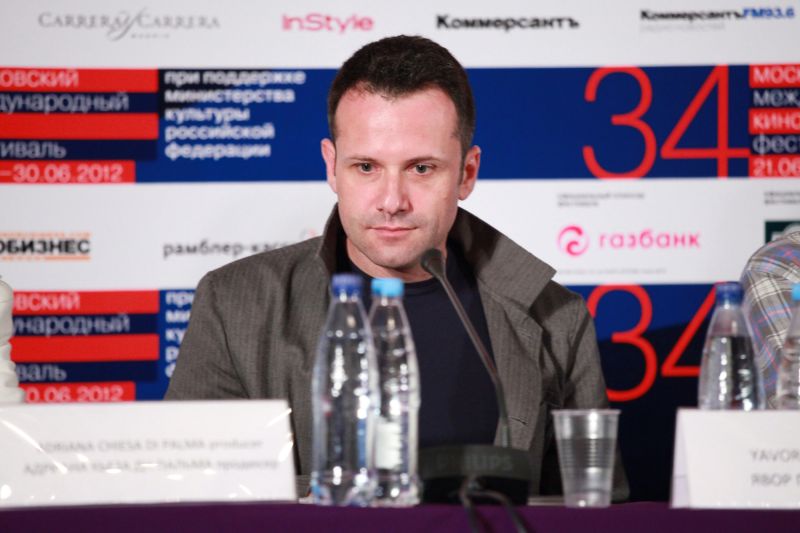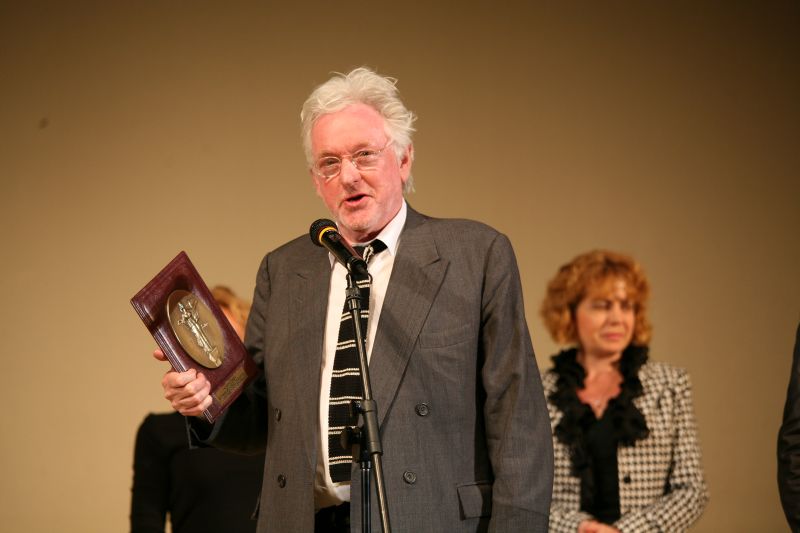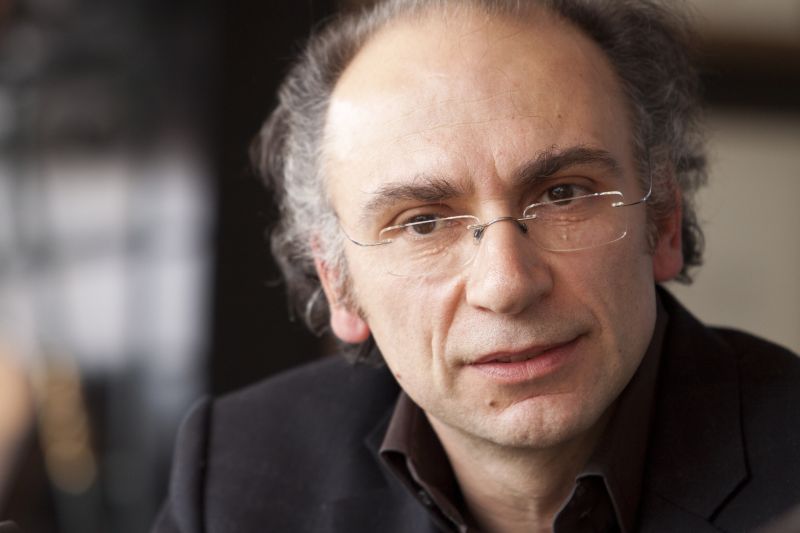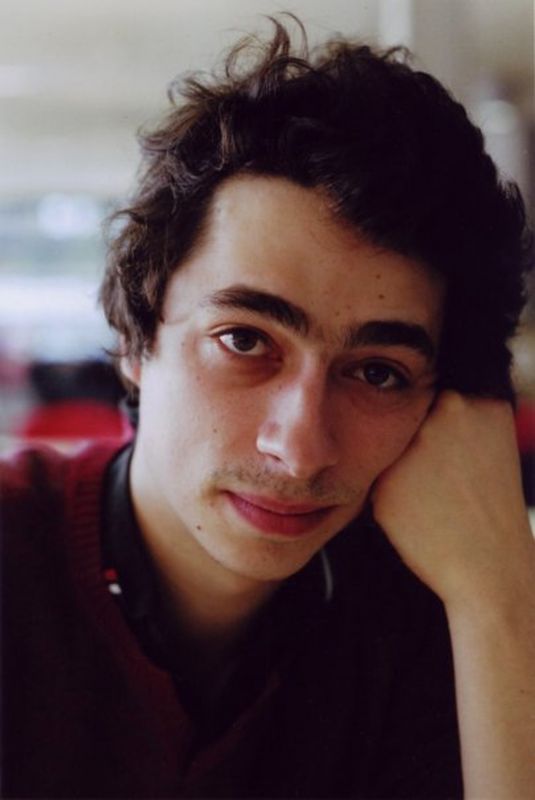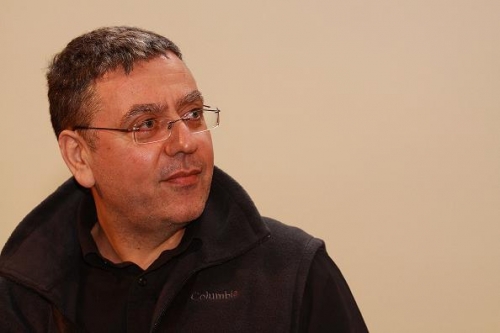|
|
||
|
Pro Tools
FILMFESTIVALS | 24/7 world wide coverageWelcome ! Enjoy the best of both worlds: Film & Festival News, exploring the best of the film festivals community. Launched in 1995, relentlessly connecting films to festivals, documenting and promoting festivals worldwide. Working on an upgrade soon. For collaboration, editorial contributions, or publicity, please send us an email here. User login |
15th SIFF news, interviews, reviews
Interview with director Zeina Durra. THE IMPERIALISTS ARE STILL ALIVE (USA, 2010) screened at this year's Sofia International Film Festival in Sofia, Bulgaria.
Some weeks ago, I had the opportunity to speak at length with Zeina Durra in Thessaloniki, Greece about her feature film debut, ‘The Imperialists Are Still Alive' (2010). We had a fun conversation about imperialism and proletariat, conventions, nonconformists, clothes, getting naked... and just everything about film in general.
Zeina is a spirited and passionate young woman and once you get her going, it's hard to get a word in edgewise, not because she interrupts but because she is just so full of ideas and inspiration that when she's talking about something she loves, she's like a humming bird buzzing at a newly bloomed blossom. Her eyes light up, she smiles and she goes on and on and never ceases to amaze. Here is me and Zeina talking about her film which opened at Sundance in 2010, no small feat for a first time feature.
ME: So, you were from London. Then, did you study...
ZD: Yes, I did my BA at Oxford and then I went on to NYU grad film and I took five years to finish. And then about 2 ½ years after film school I got funding for my first film and then it premiered in competition at Sundance during 2010 this year. I finished in August 2009 so there was a bit of a gap between finishing and it comes out on IFC on March 04 2011! It's really epic! I mean, sometimes you forget that it takes forever to get a film out.
ME: How long ago did you finish NYU?
ZD: I finished 5 years ago but I started 10 years ago!
ME: So, can you tell us a bit about what ‘The Imperialists Still Alive' means?
ZD: I mean, it was hard to find a title that has that kind of 60s sense of humor that would lend someone a sort of idea of the film. It's an awesome idea of a film because no one has really seen something like this before so it was really tricky how to introduce this subject and these characters, especially in America. There was one film I saw recently and I died in the film because it was like a perfect screenwriting class. I mean, people are not morons. They don't need to be like fed every little morsel so that they get the film. I mean, what happened to thinking? It just drives me mad. And so, I thought okay, we were watching ‘La Chinoise'by Jean-Luc Godard, my producer and I, and we were stuck for a new title that had a 60s sort of essence to it without being kind of didactic and then the subheading came on with ‘The Imperialists Are Still Alive', so I started with that. But it was interesting because, you know how you get some sort of rants during Q and A's? Well, in Greece this man came up to me and said: ‘NYU is a proletariat university for the working man'...but if you've been there recently there's just a campus full of sort of hipsters with bad hair running around the corridors ...The Greek went on to say, ‘and in your film you don't understand imperialism because they're not the proletariat in your film'. But then I tried to explain to him, that the PFLP which is like the biggest group set up, a splinter group of the PLO or wing of the PLO that was super anti-imperialist and very left wing that was run by some of the most chic characters of the era so there are lots of anti-imperialists who do come from privilege so it was really interesting that the title alone would spark such venom from this man saying that NYU was for the working class which maybe it was once but sadly it isn't now.
ME: Yes, especially as it's so expensive to study there!
ZD: It's really expensive...I have to say it was pretty amazing how many people there were at NYU from various backgrounds. Everyone was killing themselves to get through it. I mean, there was a guy from community college there. I mean, it was really quite democratic how people get into this school so...
ME: Totally agree. So, can you explain how this is a personal story. Are you a diaspora of the Middle East?
ZD: Yeah, I am originally half Middle Eastern, half Slav (Bosnian), and Palestinian. I was born and raised in London. I wanted to make a film... Post 9/11 in NY, this really heightened what had been going on all around me since my birth, how I related to people and how people related to me. After 9/11 no one really cared about hiding those prejudices and those fears anymore. So, it was quite interesting place to be. My parents really wanted me to leave NY at the time but I was just finishing my first year of grad school and beginning my second so I couldn't give it up and it was really hard and really depressing sometimes but also really important for me to be there and see how I reacted.
ME: There's a big debate between filmmakers. Some independent filmmakers are against film school and some are all for it. How do you feel about film school in general and how it trains new indie and formulaic filmmakers?
ZD: Film school definitely isn't for everyone. It wasn't an academic decision for me because we didn't have to write essays. But I do like being in an environment where I am criticized. And not necessarily because I like criticism but because it equips me for the world. All those wussy filmmakers who go around like ‘I don't understand why they sad that, blah blah'...well, I just think then you clearly didn't have five years of people telling you that you were shit. I had my painful time there and that's what it's really good for. And it's also really good for the people you meet because not everyone made films I like and I believe some will be great filmmakers from that school. I would have only gone to that school. I think the problem nowadays is that filmmaking has become so much cheaper and this is great but it's also a curse because a lot of people are making really bad films that they don't even think about. Maybe I'm being holier than though because I kill myself over every shot. Even when we are on shooting day and we improvise and we find something we like, I've done all my ground work so it really frustrates me when I see work from people who have clearly done no groundwork whatsoever and just kind of litter the industry with a lot of rubbish. But then again, if your work is good it stands alone. It's just kind of tiresome because when you go and see films, there's no filter now...but it also means that people who could never make films before can now, so I'm quite torn so I don't know...
ME: Your film you shot in 23 days. Was there a lot of pre-production on that?
ZD: No. There was a great amount of preparation between my DP, Magela Crosignani, and I. We worked together for a month before pre-production even started. She came to visit me from LA and she sat with me and we just like hammered out the shoot list. She's very intellectual so I really enjoyed our discourse because she was emotionally and intellectually involved and I really need that otherwise I can't work with someone. And pre-production was the usual, about 6-8 weeks, or even just a month! God!
ME: So how long was the process from writing the script to shooting the film?
ZD: Okay, pre-production was about 5 weeks, let's say.. and then we had 23 days to shoot which is about 4 ½ weeks and in that time I was editing also. It was a night shoot. I would go in and sit with my editor and go through the stuff. We had about 10-11 weeks to edit the film and we finished the final cut just before Cannes. Sound took forever because sound is expensive and the mix and we had to wait for the mix because Harvey Weinstein took over the entire studio for like five films so we got pushed back for like 3 months or something. We had good rates so we had to wait. So, we finished in August. By August 7th the whole thing had been done. But it could have been done by June had we not had that sound delay. Writing it, I wrote it really in early 2006 because I got into the Berlin campus with it. I got the money in 2008. We were casting though. One thing we did is casting took a really long time.
ME: Did you know you wanted Elodie Bouchez in the lead?
ZD: I knew I wanted somebody like Elodie. I'm not a Prima-donna. I don't expect people to be in my films. And it was my first film as well so now I hope I can hopefully try to. I told my casting director that I really wanted a European actress, preferably a French one because they really are artists, they're not just glamor machines. They may be exceptionally glamorous but they are artists. So, she liked the script and it really worked out.
ME: Do you feel you really captured something about the hodgepodge essence of American society? Do you feel that your film speaks to a global audience?
ZD: I think it's funny. People laugh because there are so many different characters from socio-economic backgrounds. That makes it funny for everyone. And then I think I captured a NY that no one has put on film recently. They did it in the 70s and 80s and early 90s but not in the past decade. What's really interesting in NY is all these art jobs, fashion, etc. Most jobs in the city are all run by foreign workers from all over the world, more than Americans.
ME: Is the main character, Asya, a reflection of you?
ZD: You know, I always used to cringe and deny it but, yes. Everyone always says to me, ‘she even wears your bracelets'. LOL!
ME: Well, you wrote it and directed it so she has to reflect some piece of you.
ZD Yes, well... Thank God I didn't have to act in it. The film would have been a flop had I been in it. I'm so self-conscious in front of the camera.
ME: I read that you and your DP don't like close-ups. Why is that?
ZD: Yeah, I hate Close-ups. Because it's just so easy and cheap and I just think, ‘Oh God', am I doing TV or am I doing cinema? I mean, even if I fail I just want to have a chance to try pushing myself. I mean, going back the script classes. It's like, ‘well then you have to do A, and then you have to do B, and tie it up C to the point A and V ...that'... like a friend of mine made a film, a very quiet story set on the border of Turkmenistan and my friend who was sitting next to me had been trying to work out the whole story based on typical structure of script writing. For me, it's like the writing. I would really rather risk misinterpretation of my film than to use bad shots. I don't want to manipulate someone. I just want to show them how I see things. There's a thin line between manipulating your audience and then showing them something to contemplate.
ME: Right...I couldn't agree more. So, tell me about the opening scene with Elodie being shot in complete nudity. Why was this just the right way to establish the main character Asya?
ZD: It's really hard and it wasn't meant to be provocative at all and I never believe filmmakers who start a film by someone giving someone a blowjob, etc. But sometimes if you just feel that that's how you need your film to start then that's what you need to do. I can't really say why... Except for the fact that you've known about this character before and I just wanted to put an image that you would have throughout, to like burn on your brain and then you have the film. And somehow when you away you'll kind of connect it. It's a film very much about what you take away...And in NY what was great was that people wouldn't just say, ‘yeah it was beautiful' which usually means they didn't enjoy it. But they would come back and say that they would think about it. One woman said she had dreamt about the film for a whole week after seeing it, that she couldn't get it out of her subconscious and she just dreamt of that image the whole time and she just realized, ‘oh my god it's an awesome film'. But I realize that a lot of people it may not quite work 100% with them while they're sitting there, because it's not particularly conventional, they go home and somehow they will remember it and say, even if they don't like the film, ‘damn, why can't I get it out of my head! It's so annoying but I couldn't stop thinking about it'.
ME: Well, by with starting with such a raw image, her bare skin without all of the clothes, art and persona covering her up...just naked.
DZ: Yeah, right, also it's about that perception and the naked image which has been linked with evil for so long and also about basic civil and human rights and something that's ingrained within all of us.
ME: Would you say that your film is really about? Is it as you say, ‘it's not about religion, it's about resistance'?
DZ: Right! There you go!
ME: So, tell us what you're doing next.
DZ: I just finished the draft of my new film. I was gonna' do a road trip movie in Jordan but it's just going to be too much in this climate so I'm going to stay in England for now. But I'm doing a film it's called ‘Chinchilla Killer'. It's a subversive English country house drama.
ME: Great, I love your new genre... ‘subversive English country house drama' lol! Well, it's been great talking with you... Oh, and by the way, I believe your associate producer is Mr. Kaleem Aftab.
DZ: Yes, he's one of my best friends! He's my neighbor in London and such a good friend. How do you know him?
ME: Well...He's the one who told me to see your film. But little did I know I'd be sitting here interviewing you. Thanks for your time, Zeina...It's been fun. Can't wait to see the killer in the country house...
written by, Vanessa McMahon January 19, 2011
For more on Zeina Durra and her new film and trailer, visit her website: Zeina Durra read this article by journalist Kaleem Aftab: http://www.independent.co.uk/arts-entertainment/films/features/talent-20... 21.03.2011 | Sofia International Film Festival's blog Cat. : 24 Hours 9 actress Album America Asya Berlin Berlin campus Bulgaria Cannes Cannes Chinoise'by Jean-Luc Godard Contact Details Director editor Entertainment Entertainment Greece Harvey Weinstein http://theimperialistsarestillalive.com http://www.independent.co.uk/arts-entertainment/films/features/talent-20 Interview with ZEINA DURRA Jordan Journalist Kaleem Aftab London Louisiana Middle East New York NYU Oxford Palestine Liberation Organization Person Career Popular Front for the Liberation of Palestine Producer So Plastic So Pretty Social Issues Social Issues Sofia SOFIA INTERNATIONAL FILM FESTIVAL Sundance Technology Technology United Kingdom US Federal Reserve Vanessa McMahon January Zeina Durra
|
LinksThe Bulletin Board > The Bulletin Board Blog Following News Interview with IFTA Chairman (AFM)
Interview with Cannes Marche du Film Director
Filmfestivals.com dailies live coverage from > Live from India
Useful links for the indies: > Big files transfer
+ SUBSCRIBE to the weekly Newsletter Deals+ Special offers and discounts from filmfestivals.com Selected fun offers
> Bonus Casino
User imagesAbout Sofia International Film Festival International film festival for feature films, documentaries and shorts (mainly Bulgarian). Main themes: International competition for first and second films, Balkan & Bulgarian cinema, Cinema Europe, World screen, retrospectives. View my profile Send me a message My festivalThe EditorUser contributions |



















